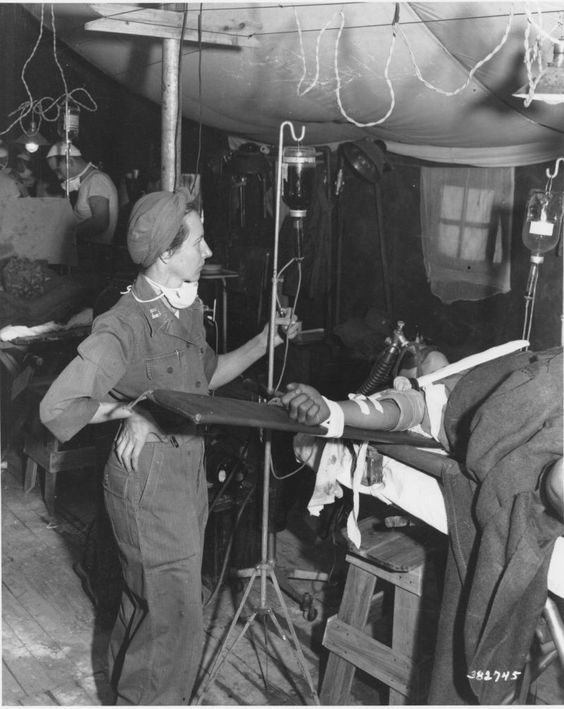© Constance J. Moore
Colonel, ANC (Retired), ANCA Historian
In July 1950, the Korean War began when the Communist North Korean Army crossed the 38th parallel, an arbitrary separation of North and South Korea, and invaded the Republic of South Korea. Captain Viola B. McConnell was the only Army nurse on duty in Korea. When hostilities broke out, she escorted 643 evacuees from Seoul to Japan on a Norwegian freighter, the Rheinholt, which was designed to accommodate only 12 passengers. Forsaking her own well-being, she discarded her personal belongings in Korea in order to carry bandages and other first aid equipment for casualties.
CPT McConnell assessed priorities for care of sick evacuees and worked exhaustively with a makeshift medical team to ensure the sick and vulnerable were stable until they reached more definitive care. She also supervised the rationing of food and the maintenance of sanitation during the voyage. After the beleaguered vessel arrived at the 118th Station Hospital in southern Japan, she requested reassignment back to Korea. She returned to Taejon to care for and evacuate wounded soldiers of the 24th Infantry Division.
 Because mobile and evacuation hospitals followed the troops and extremely fluid battle lines, Army nurses such as CPT McConnell often found themselves closer to the front than anticipated. The nurses were challenged to improvise and function in a multitude of shelters, such as tents, barns, schoolhouses, and churches. Conditions were rudimentary – no running water, and earth floors with potbellied stoves for warmth and water heating. Patients’ beds were low folding cots, which entailed a great deal of uncomfortable bending or kneeling to tend patients.
Because mobile and evacuation hospitals followed the troops and extremely fluid battle lines, Army nurses such as CPT McConnell often found themselves closer to the front than anticipated. The nurses were challenged to improvise and function in a multitude of shelters, such as tents, barns, schoolhouses, and churches. Conditions were rudimentary – no running water, and earth floors with potbellied stoves for warmth and water heating. Patients’ beds were low folding cots, which entailed a great deal of uncomfortable bending or kneeling to tend patients.
Disposable supplies and unit dose medications were conveniences of the future. Nurses autoclaved catheters and sharpened needles. They prepared injections by mashing pills in a mortar, heating the powdered mix in a teaspoon over an open flame, and drawing the liquid into a glass syringe. Oxygen tanks were strapped to patients’ beds. In the summer, without air conditioning for airflow, tent flaps or windows were raised, and doors opened, allowing insects to enter the wards and birds to fly through the surgical theaters. In the winter, to keep medications from freezing, nurses carried IVs, penicillin, morphine, and other liquid pharmaceuticals in their parka pockets. Despite these austere conditions, CPT McConnell persevered and focused on the needs of her patients. For her services during the war, this exceptional Army nurse was awarded the Bronze Star, and an Oak Leaf Cluster for the Bronze Star was given for her outstanding care of the American nationals during the evacuation to Japan.
Today, the quiet courage and devotion of this Army nurse has earned the deep respect of her fellow Soldiers. A description of her Korean War duty performance is used as the real-world example of the Army virtue of “duty” in the Initial Entry Training (IET) Soldier’s Handbook. Every new IET Soldier (formerly called Basic Trainee) is being inspired by her selfless service. CPT McConnell is the first Army nurse so cited in an Army publication.
________________
Sources: A primary source is the TRADOC Pam 600-4 Initial Entry Training Soldier’s Handbook (4 September 2007), at http://www.tradoc.army.mil.
Secondary sources include COL (R) Mary Sarnecky’s book, A History of the U.S. Army Nurse Corps; her article called Army nurses in ‘the forgotten war,’ in the November, 2001 American Journal of Nursing 101 pp. 45-49; and Deborah Hallquist’s publication, Developments in the RN First Assist Role during the Korean War American Operating Room Nurse Journal. FindArticles.com. 26 Feb, 2010. http://findarticles.com/p/articles/mi_m0FSL/is_4_82/ai_n15754451.